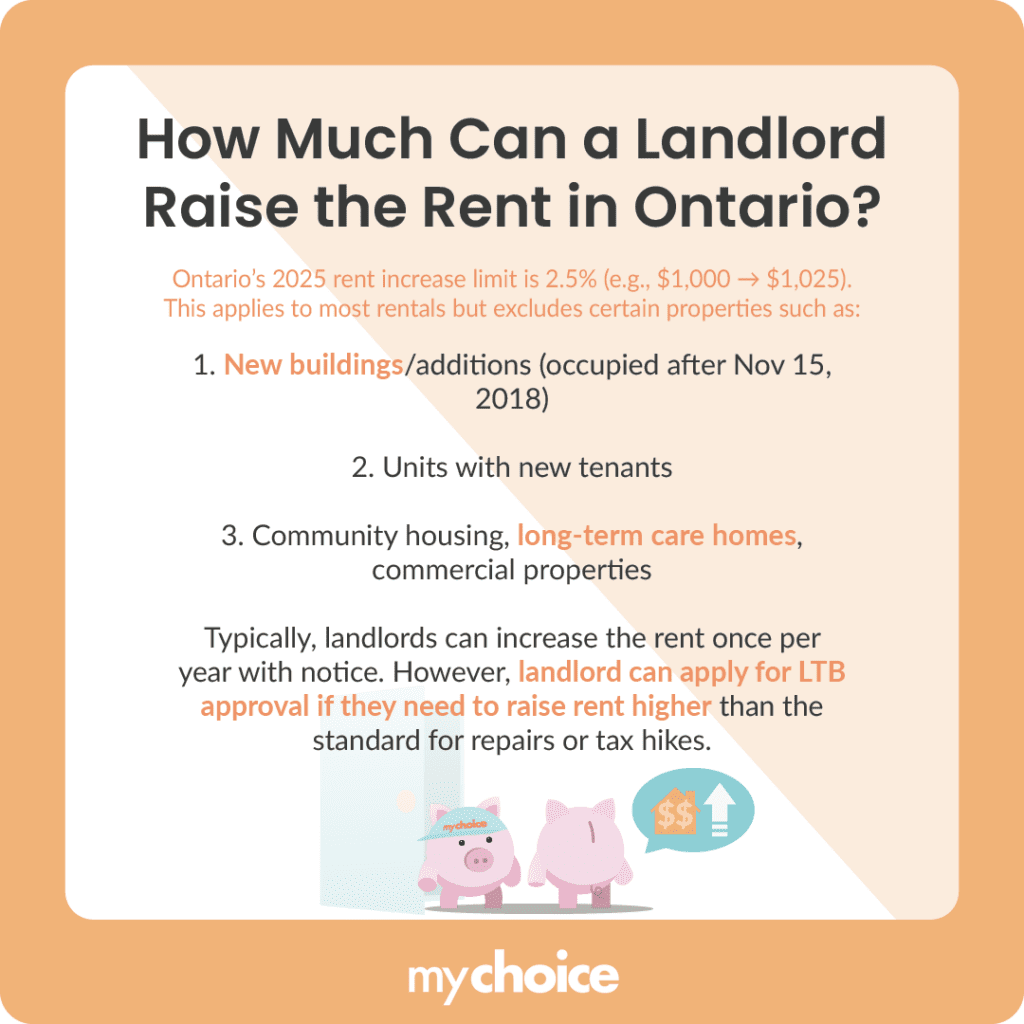In Ontario, the provincial government sets a rent increase guideline each year, which caps how much landlords can legally raise the rent for most residential units. To stay informed and law-abiding, both tenants and landlords need to understand the process of a rent increase, the rules, and their respective rights.
How much can a landlord raise the rent in Ontario? Do they need to provide a notice? How often can landlords increase the rent? Read on to learn everything you need to know about rent increases and what to do if your landlord fails to follow the guidelines.
How Much Can a Landlord Raise the Rent in Ontario?
The provincial government of Ontario set the maximum allowable rent increase for 2025 at 2.5%. This means that if your rent is $1,000 a month, for example, then your landlord can only raise it to $1,025 a month. This guideline applies to most tenants who reside in rented living areas. However, there are some rental properties that this guideline does not apply to:
- New buildings, additions to existing buildings and most new basement apartments that are occupied for the first time for residential purposes after November 15, 2018
- Rental units upon turnover of a tenancy (the landlord and new tenant agree on the rent amount)
- Community housing units
- Long-term care homes
- Commercial properties
In these exempt buildings, landlords could theoretically raise the rent by any amount, provided that they give proper notice. Landlords still cannot increase rent more than once every 12 months in these buildings, and they must continue to operate under the Residential Tenancies Act of 2006 (RTA).
However, there are some cases where landlords are able to raise the rent by more than the maximum rent increase rate of 2.5%. Landlords can apply to the Landlord and Tenant Board (LTB) for an Above Guideline Increase (AGI) if they’ve made significant capital expenditures or experienced a substantial increase in municipal taxes. These AGIs still need to be approved by the LTB; otherwise, the rent can only be increased by the guideline amount.

How Much Notice Does My Landlord Need to Give Me Before Rent Increase in Ontario
Under Ontario law, a landlord must provide a tenant with a formal written notice of any rent increase at least 90 days before the date the new rent amount takes effect. This notice should include the following details:
The 90-day notice requirement applies in almost all cases unless your unit is truly exempt from the rent guideline legislation. If your landlord fails to provide the appropriate written notice, the increase is not valid on the date stated. Should you find yourself in that situation, you do not have to pay the higher rent amount until 90 days after proper notice has been given.
Rent Increase Rules for the Rest of Canada
Every Canadian province and territory has its own set of regulations regarding rent increases. Here is a summary of each region’s guidelines and notice requirements:
| Province | Rent Increase Cap | Notice Period |
|---|---|---|
| British Columbia | Typically tied to inflation; 3% rent increase cap for 2025. | Landlords must give at least 90 days’ notice. |
| Alberta | No specific rent increase guideline or cap. Rent increases cannot occur more than once per year for the same tenant. | Landlords must give at least 90 days’ notice. |
| Saskatchewan | No official rent increase guideline or cap. Rent increases cannot occur more than once per year for the same tenant. | Landlords must give at least one full month’s notice. |
| Manitoba | 1.7% rent increase cap for 2025. Above guideline increases need approval. | Landlords must give at least 90 days’ notice. |
| Quebec | Determined by the Tribunal administratif du logement (TAL) each year. It can vary by unit type and construction date. | For a lease of 12 months, notice should be given between 3 and 6 months before the end of the lease term. |
| New Brunswick | 3% rent increase cap for 2025. | Landlords must give at least 90 days’ notice. |
| Nova Scotia | 5% rent increase cap for 2025. | Landlords must give at least four months’ notice. |
| Prince Edward Island | 3% rent increase cap for 2025. | Landlords must give at least 90 days’ notice. |
| Newfoundland and Labrador | No official rent increase guideline or cap. Rent increases cannot occur more than once per year for the same tenant. | Landlords must give at least 90 days’ notice. |
| Yukon, Northwest Territories, and Nunavut | No official rent increase guideline or cap. Rent increases cannot occur more than once every six months for the same tenant. | Landlords must give at least 90 days’ notice. |
What Should I Do if My Landlord Breaks the Rules
If you suspect your landlord is not following the correct procedure for a rent increase, here are some steps you can take:
Key Advice from MyChoice
- Stay informed of changes to the rent increase guidelines every year.
- As a tenant, mark your calendar with the date you moved in or the date of your last rent increase. This will help you keep track of when to expect further rent increases.
- If you suspect your landlord is asking for an illegal rent increase, take action as soon as possible. Communicate with your landlord for clarification first, then contact the LTB or other legal professionals if needed.








